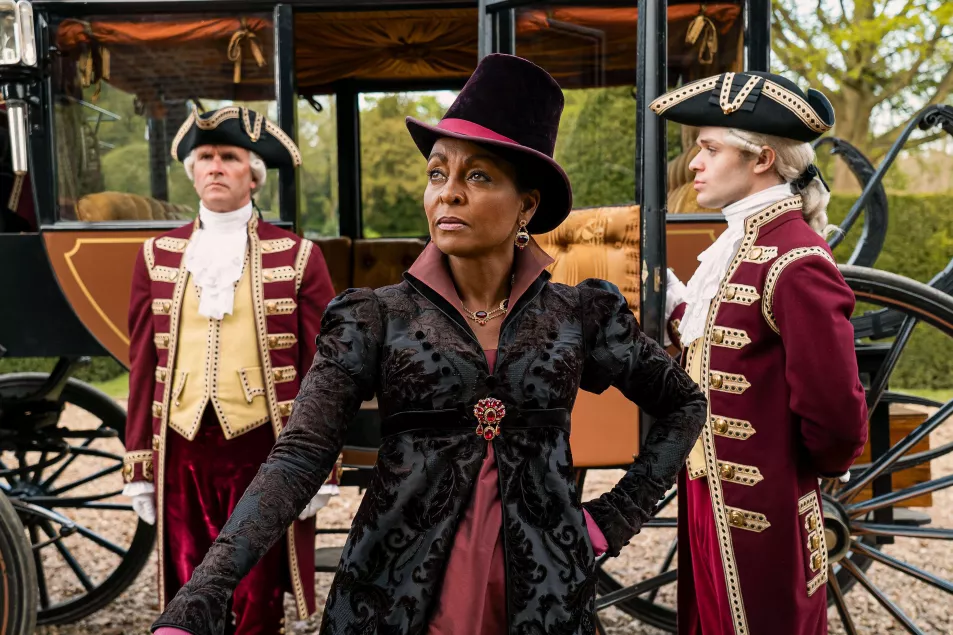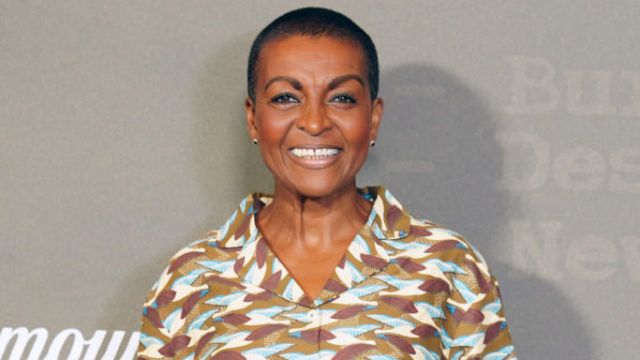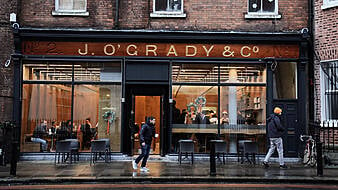During lockdown in 2020, when everyone was at their local supermarket losing their minds over pasta and toilet roll shortages, Adjoa Andoh went to Brixton Market instead.
“Brixton Market is full of traders who may not have originally come from the UK, or they’d be local working-class people, who have always had to look beyond the standard ways of operating to survive,” says the 60-year-old actress, best known for her role as Lady Danbury in the hit Shondaland and Netflix series Bridgerton.
“They find a way, just like water. And I think Lady Danbury is like water too, in that regard. She finds a way.
“From watching [Bridgerton prequel show] Queen Charlotte, we now know that she was brought from the higher echelons of a West African traditional society to the higher echelons of society in this country,” Andoh continues.
“She had to be strategic, learn from past experiences, and then make the decision to share the wisdom with those coming up after her. Those were the things I wanted to highlight in Lady Danbury.”

It’s far from the first time Bristol-born Andoh – whose TV credits also include Doctor Who and The Witcher, alongside a successful stage career – has taken strides to highlight the roles of women.
When she and her good friend, playwright Lynette Linton, directed the first-ever company of women of colour in a Shakespeare play – Richard II, which showed at The Globe Theatre a few years ago – she made a conscious decision about the portraits displayed around the set. Instead of kings and queens, black and white portraits of the casts’ mothers, aunties, grandmas and other women who’d been carers in their lives, were selected.
“Women are amazing. But that doesn’t mean I’m saying men aren’t fantastic,” Andoh says today. “I just think we need to be better at celebrating all of the women in our lives, who have got us to where we are.”
When we speak, she is just about to go onto a busy set to record a new ITV special called Breaking Through, which coincides with October’s Black History Month, created by ITV senior creative producer Joel Duncan.
With Zeze Millz as the host, it sees Andoh join her Bridgerton co-star Ruby Barker — who reportedly won’t be returning for season three — and Coronation Street’s Channique Sterling-Brown, in a deep dive about the highs and lows of the industry and their real and honest experiences of being black women on screen.

“The generosity of some black women became fundamental for me in my career, after throwing away my law degree. I discovered literature I didn’t know existed, and had [friends that became] sisters, who told me about auditions that would put me in direct contact with them, at a time when there were scarce parts for black women,” Andoh reflects.
“You don’t pull up the ladder behind you. You open the door wider, network, encourage and bring people along. We need to share our histories, so we know what’s gone before us and can then build on it. Instead of starting something from scratch.”
It’s what the world of Bridgerton does so well, she believes – creating a space where black women can see each other in interesting ways that aren’t just about “misery porn”, as Andoh likes to call it. Bridgerton is fiction at one level, but there are facts woven in about the presence of black women in this country.
“You see Golda Rosheuvel [who plays the elder Queen Charlotte] being smart and funny, and all the amazing young actors in Queen Charlotte. You see us in our finery, in the turn of a phrase, the raise of an eyebrow. You get all that fabulousness in that world, and why should we not be fabulous?

“I hope we have brought all of that to the living room, and continue to do so in season three. I want all viewers to be able to watch people of colour in historical roles, not blink and focus on the story – instead of saying, ‘Oh my god, there is a black woman in a corset’. No. Move on.
“But there are conversations about the centuries and centuries of slavery, human trafficking, sexual and body exploitation, degradation as a human spirit and how we are viewed by the rest of the world, that we haven’t even started to have. All of these things impact our daily lives,” Andoh adds.
As for her own path to the stage and small screen – she recalls something magical happening back in the 1970s, when she was a somewhat depressed 16-year-old, growing up in a small Cotswolds village with a Ghanaian father and English mother. Andoh, who was still doing her A Levels at the time, watched Plenty, a play written by David Hare, and found herself incredibly moved by the story.
“I knew there was a lesson in there somewhere as an artist. That story was all about a woman finding her moment, using the gifts she was blessed with to the best of her ability, and then being told to put them back in a box. It was heart-breaking, but there was something magical about that,” she recalls.
This is why Andoh – for whom the church has long been a part of her life – opted not to become an ordained priest and remained a licensed reader for the Church of England instead, where she is classed as a bridge between the clergy and the congregation. Or even pursue her dream of becoming a bass player in a punk band. The pull towards acting proved too great.
“My Christian faith is what gives me a place to sit down and cry, be encouraged and find communion with other people. It’s also why I’m constantly thinking about who I am, what I am doing, and in what way is it productive — in a wider sense — of the world around me.
“And if I’m not doing those things, that’s when I step away,” she reflects. “But I like acting, and that’s my gift.”







